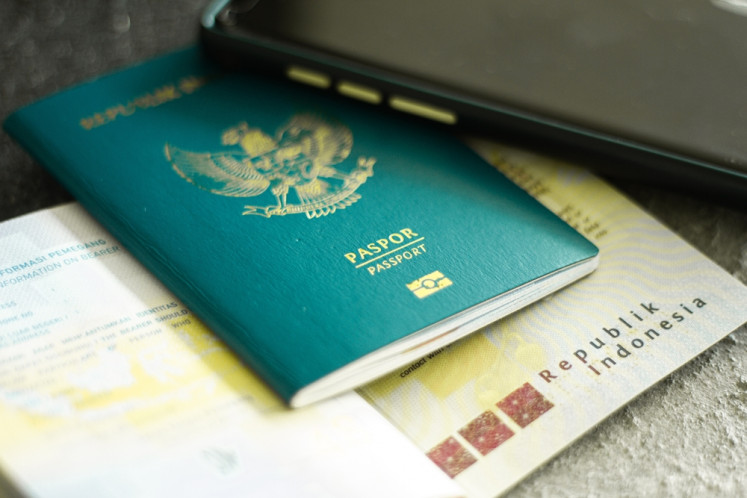Religion, human rights shape race in eastern Indonesia
With the presidential candidates mostly concentrating on the much more populous islands of Java and Sumatra, not much change is expected in the more remote eastern parts of Indonesia
Change Size

With the presidential candidates mostly concentrating on the much more populous islands of Java and Sumatra, not much change is expected in the more remote eastern parts of Indonesia.
The eastern provinces of West Nusa Tenggara (NTB), East Nusa Tenggara (NTT), North Maluku, Maluku, West Papua, and Papua are home to 13.4 million registered voters, making up about 7 percent of the electorate.
Majority Muslim NTB and North Maluku were among the 10 provinces that Gerindra Party chairman Prabowo Subianto won in the 2014 election, while Maluku was a close-run race in which President Joko “Jokowi” Widodo garnered 50.5 percent of the votes compared to Prabowo’s 49.5.
In predominantly Christian NTT, West Papua and Papua, Jokowi won landslide victories, garnering well over 60 percent of the vote in the provinces.
In NTB, with the support of popular former governor Zainul Majdi, also known as Tuan Guru Bajang (TGB), Jokowi is expected to improve on the paltry 27.5 percent of the vote he got in 2014.
TGB, a respected Muslim scholar and head of NTB’s largest Islamic group Nahdlatul Wathan, supported Prabowo’s 2014 presidential bid, but has since switched sides, publicly backing Jokowi in July 2018.
Mataram Islamic State University (UIN) political observer Agus said that the NTB electoral map had shifted significantly between 2014 and 2019.
“In 2014 Prabowo and [then-running mate] Hatta Rajasa won because NTB government elites, including the governor and eight out of 10 regional heads, supported them,” he said. “But now the position has changed.”
He said that most regional heads in the province now supported Jokowi over Prabowo and that TGB was still very influential in the conservative Muslim region.
“Even if Prabowo wins, he won’t be as successful as in the 2014 elections,” Agus said.
The Maluku islands, which were split into two provinces shortly after the fall of Soeharto, were the site of bloody sectarian conflict between Muslims and Christians between 1999 and 2002.
Political scholar Marcus Mietzner, who recently visited Maluku, said “arguably, in no other province in Indonesia do voters so consistently support presidential candidates based on their religious identity”.
In the predominantly Muslim Batu Merah area outside of Ambon, for example, Mietzner said that voters thought that the Jokowi government had failed to bring them prosperity and believed claims that Jokowi would abolish Islamic education and ban the call to prayer.
In Christian Batu Meja, on the other hand, Mietzner said that “Christian residents expressed their fear that a Prabowo victory would be the equivalent to a victory for Hizbut Thahrir Indonesia”, an Islamic mass organization that was disbanded in 2017 for promoting the establishment of a caliphate in Indonesia.
Despite the apparent division along religious lines, Jokowi regional campaign team head and Maluku Governor Murad Ismail said that he was confident that the Jokowi-Ma’ruf Amin ticket would garner 70 to 75 percent of the vote in the province.
“What’s certain is that all the supporting parties are working hard to ensure a Jokowi-Ma’ruf victory in the election,” he said as quoted by Antara.
Meanwhile, in Papua and West Papua most polls show Jokowi with a formidable lead, despite ongoing violence between separatists and military forces.
Indonesian Institute of Sciences (LIPI) researcher Cahyo Pamungkas, who is part of LIPI’s Papua Studies team, said that Papuans had seen Jokowi as a “new hope” in 2014.
“His track record as mayor [of Surakarta, Central Java] and governor [of Jakarta] showed that he was a civilian who was willing to engage in dialogue, in contrast to Prabowo who has a military background,” Cahyo told The Jakarta Post.
He said that while Jokowi had made good on some of the promises he made to the Papuan people in 2014, particularly with regard to infrastructure, his administration’s lack of progress on human rights issues had disappointed Papuans.
“There is appreciation but there is also criticism,” he said.
He added that what Papuans wanted most was a sense of security and freedom of movement, which was hampered by the large presence of security forces in the region.
“For Papuans, the more soldiers and police officers they see, the less safe they feel,” he said. “There is disappointment that Jokowi has not been able to reduce the military presence in the area.”
Cahyo said that his recent conversations with community and religious leaders had indicated an increase in support for Prabowo compared to 2014, as some felt that he may have an easier time “controlling” military forces.
“From what I see there is not much difference between Jokowi and Prabowo with regard to political and human rights issues,” he said, comparing them unfavorably to former president Abdurrahman “Gus Dur” Wahid, who had allowed Papuans to raise the Morning Star flag, considered by many as a separatist symbol.
“Gus Dur represents the ideal president for Papuans, but it may take decades for a leader with a similar perspective to emerge,” he said.
Despite the disappointment with Jokowi, Cahyo still predicted that the president would prevail in the region, especially since he had secured the support of elites such as Papua Governor Lukas Enembe.
“In the 2018 gubernatorial election, Lukas, who was considered a champion of native Papuans, won in the mountainous regions and lost in the coastal regions, which have a larger population of migrants from other islands,” he said. “I think that the same thing will happen in the presidential election.”









